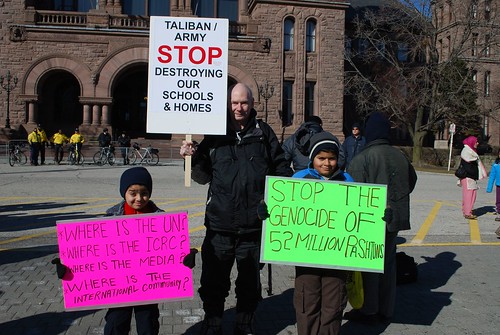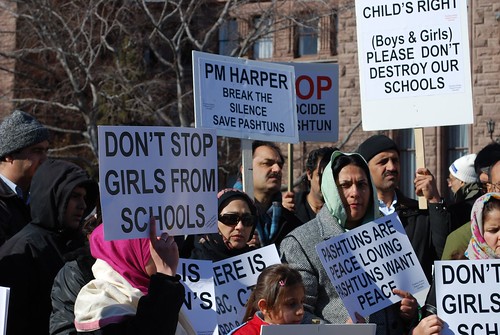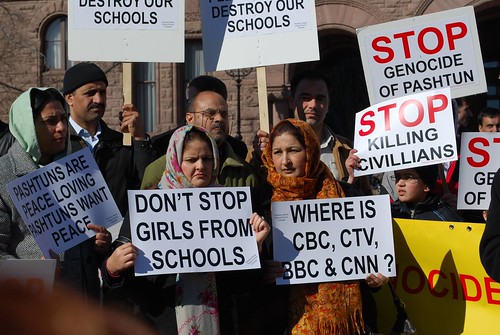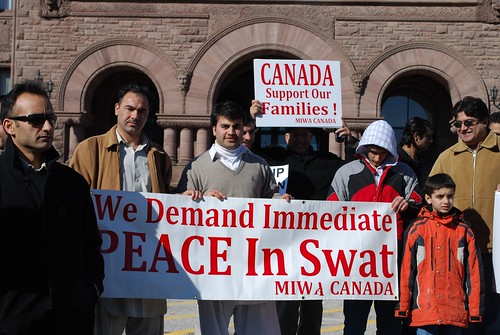Toronto Rally Against Taliban Atrocities
 Introducing Islamic law into the Swat Valley of northwestern Pakistan will only encourage the Taliban to terrorize a wider region than they do, Pashtun Canadian leaders told demonstrators at a Toronto rally yesterday.
Introducing Islamic law into the Swat Valley of northwestern Pakistan will only encourage the Taliban to terrorize a wider region than they do, Pashtun Canadian leaders told demonstrators at a Toronto rally yesterday.The news out of NWFP overshadowed everything. More here. More photos here.
The rally was enthusiastically endorsed by the Canada-Afghanistan Solidarity Committee. Said CASC's Lauryn Oates: “Canadians must urgently confront the commonplace and bigoted misconception in this country that the Taliban are somehow a legitimate expression of Pashtun or Afghan culture or politics.”
UPDATE: For all those numpties who greet the news of this rally by asking stupid questions like 'Why haven't they raised their voices before?', as though they haven't, read this: Taliban Threats in Pakistan Are Heard a World Away. Plus, my comrade and CASC member Jim Monk was on hand and here are some of his photos (the first is one that someone took of our Jim):









7 Comments:
It sucks when you kill yourself thinking you could have done more, been more inventive, more emphatic or just more.
...and then you realize they just don't give a shit.
More photos here: http://tinyurl.com/d4e823
Thanks, Jim
So considering the evident state of affairs in Swat and elsewhere, would you say that Canada is lining up on the wrong side of this "awakening" proposal?
Patrick:
No, I wouldn't say Canada is lining up on the wrong side of this question. McKay is right to be exceedingly suspicious of this approach, and quite frankly, I don't trust the Americans to get it right.
The Americans will naturally and sensibly draw on the successful aspects of their experience in Iraq in their approach to the tribal leadership in rural Afghanistan, and so the strategy will be discussed publicly with reference to Iraq. But the comparison with Iraq just tends to muddy the issues and challenges and options in Afghanistan.
A related debate-muddying issue is the problem of the the term "Taliban" in this context. In a lawless, failed-state environment, distinctions are difficult to make, but necessary to understand, between a) committed jihadists on the payroll of one of the three main Taliban chains of command b) unemployable ypung male hillbilly Taliban mercenaries c) Hez-b-Islami militants who tend to be oriented towards Iran d) anti-government tribal warlords who resort to primitive "Sharia" justice to maintain law and order (i.e. Swat), and e) an almost infinite variety of brigands, drug runners, and gangsters whose allegiances and associations are shifting, murky and opportunistic.
There is a tendency to use the term "Taliban" to describe groups in each of these categories, and to attribute to "the Taliban" outrages committed by groups in each of these categories.
To take an optimistic view, the Afghan government's approach in Wardak may serve as something of a model; there, tribal militias, some formerly considered "loyal" to "the Taliban," have been more or less absorbed as a kind of arm of the Afghan state, and when I was in Afghanistan I spoke with NGO people who liked to say "Hell, we even put the Taliban in Wardak in our payroll" as a kind of wild conversation-opener when the subject came up.
But I don't trust the Americans in these "Anbar" initiatives, quite honestly, and I think they have to be watched very, very closely. Not because an Anbar approach won't "work," but because it will "work," for objectives I consider secondary at best.
If their purpose is an exist-strategy function to "end the war" in Afghanistan, the Anbar approach is without question the best approach.
But if your purpose is to persist in the slow and steady emancipation of the Afghan people and to help create the democratic space to allow the Afghan people to regain their sovereignty throughout the country, you will want to be very careful about all this "Awakening" business.
I agree with you, the use of Taliban as a blanket term for the broader Afghan insurgency is problematic.
One of the problems this poses is when military leaders occasionally muse about "negotiating with the Taliban". What I've always understood about this is that it's meant to mean negotiating with individuals such as Gulbuddin Hekmatyar, who've proven themselves open to negotiation, even if they have a tendency to violently go back on the deal.
As I'm certain you're aware Hekmatyar has been part of a few governmental arrangements in Afghanistan, and has reneged on nearly all of them.
I initially agreed with MacKay's rejection of the awakening idea myself. Now I am a little less unsure.
With Sharia law set to be insituted in Swat, the Pashtun's traditional aversion to Sharia law could make that particular region one where such a tactic could reap dividends -- although this would require operating in Pakistani territory.
Our disagreement about the context of Pashtun opposition to the Taliban aside, one has to imagine that Pashtuns are as ready to take up arms against the Taliban as they ever were.
If my readings of the sparse news stories regarding what's going in Swat are accurate, the region seems to lack well-equipped and well-trained Pashtun militia who can forcibly resist the Taliban or any other pro-Sharia law insurgencies. Using military force to provide safe space for such organizations to develop could reap dividends.
But I agree that the potential consequences are far too dire to take such an intiative lightly. For one thing, there is the undeniably adverse relationship between the Pashtun tribes and any central government. Helping such militia develop would essentially take trying to impose the central government's sovereignty over the Pashtun regions off the table, even if we agree that this should be a mission objective.
(Personally, I wouldn't. If the Pashtun want to live peaceably according to their own customs and way of life, I say they're entitled to. Basically, I accept the case for Pashtun sovereignty and self-government.)
An "awakening" process could shape the Afghan state in ways that we cannot predict. Further down the road it could even perpetuate the vicious cycle of civil war that Afghanistan has been locked into for the better part of a century.
If the Americans want to proceed with this, they'd best do so very carefully.
Patrick:
"What I've always understood about this is that it's meant to mean negotiating with individuals such as Gulbuddin Hekmatyar, who've proven themselves open to negotiation, even if they have a tendency to violently go back on the deal."
Not quite right. When you hear reports that military types favour "negotiating with the Taliban," the closer you look into it, it usually means some NATO commander has expressed some optimism about striking deals with local Taliban-oriented tribal warlord/chieftains for purely practical and tactical purposes. For which there may be arguments against or in favour, on a case-by-case basis.
Where Hekmatyar comes into it is he's more than once expressed openness to "negotiations" in the hope that he can cut himself a deal that would save his life and keep himself in beer and skittles, and it gets more confusing because Hezb-e-Islami split some years back, with Hekmatyar's crowed refusing to come down from the hills, and the main branch of Hezb-e-Islami, scum though they are, agreeing to put down the gun and take positions in the provisional government brokered by the Bonn Agreement. Better remedy: A bullet in the back of Hekmatyar's head.
As for "Sharia" in Swat, what I think is important to remember, repugnant though the arrangement may be, is that the ANP government is quite wise to the appeal of "the Taliban" among the tribes, and the ANP's offer to allow Sharia in Swat is intended to buy time and severely undercut the Talibans' appeal by allowing "Sharia" courts to provide quick justice rather than rely on the antiquated and bollocksed "justice system" administered out of Islamabad. It's not really so much a matter of "Sharia law set to be instituted in Swat"; in some cases it's merely translating the names of certain crimes into Arabic. I remain highly doubtful that it will change anything for the better in the long term or even the immediate term. But facts and context are important.
As for the Pashtuns' ability to "take up arms" against the Taliban, I think, as I take it you do, that it's dreaming. I'd add it's counterproductive: The clear wish of the majority of Pashtuns on both sides of the Durand Line is to do politics without the guns, and the "Taliban" have all the best guns and all the money and connections anyway. That's why they need professional military bodies to take up the armed struggle against "the Taliban."
"Using military force to provide safe space for such organizations to develop could reap dividends."
That is what NATO/ISAF is about in Afghanistan, and that is what the Pashtuns are calling for, logistically and strategically, on the Pakistan side. It's important to bear in mind that the Pashtun leadership is in the main nationalist but "anti-separatist" in both Pakistan and Afghanistan, and this is especially important to stress in Afghanistan to avoid the retreat into ethnic rivalry and to maintain the hard-won, broad consensus around the Afghan "identity." Specifically (whether it's practical or achievable or not is beside the point) the Pashtun leadership is pretty well united around the idea of a reconstituted international-community strategy that would focus on providing support for conventional political development(institutions, political parties)throughout Pakhtunkwa.
As for this: "If the Pashtun want to live peaceably according to their own customs and way of life, I say they're entitled to. Basically, I accept the case for Pashtun sovereignty and self-government. . ."
Be careful what you wish for, because if you go down that road very far Afghanistan could collapse, and also because when it's put that way it's not quite what the Pashtuns wish for: a) if it means a "way of life" that is at odds with the extension of the rule of law in Afghanistan and the sovereignty of the Afghan state throughout Afghan territory or b) if it is at odds with basic international human rights' standards.
It's one thing to make the case for devolution and regional autonomy. It's quite another to allow a professed respect for a local "way of life" to override fundamental human rights.
Post a Comment
<< Home